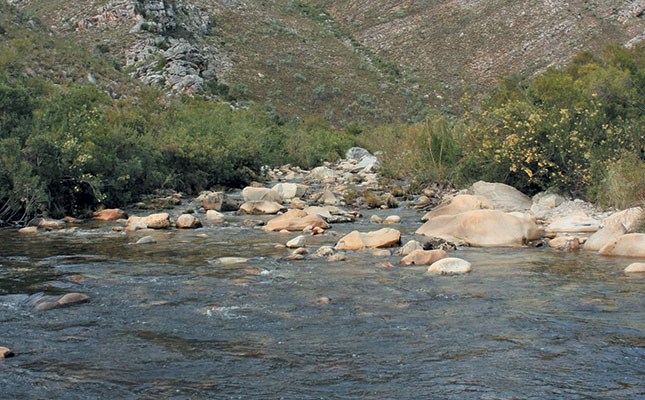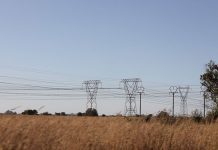
Photo: FW Archive
What is ENSafrica?
ENSafrica is Africa’s largest law firm. It has more than 600 practitioners, and offices in Cape Town, Sandton, Durban and Stellenbosch. It has a natural resources and environmental department that specialises in environmental and water law.
READ South Africa’s water-saving roadmap
Its practitioners are proficient in a number of areas, including:
- Representing farmers in their engagements with the Department of Water and Sanitation.
- Advising farmers on water supply, as well as in wastewater irrigation-related disputes.
- Representing farmers in verifying their water uses as existing lawful water uses.
- Assisting farmers with legal water audits, thereby helping them understand what their water-use entitlements are.
- Assisting farmers to ensure that their water usage is correctly registered and licensed.
- Representing farmers with regard to water-use charge disputes.
- Advising banks’ agribusiness divisions, as well as farmers, on the water law considerations that need to be taken into account in transactions.
Why are water rights important?
South Africa is recognised as the 29th driest country out of 193. It receives an average annual rainfall of 492mm, whereas the global average is 985mm. During the past 24 months, eight of nine provinces were declared drought disaster areas.
Thus, when the authorities look to cut back on a farmer’s water supply, that farmer inevitably asks the question, ‘But what are my rights to water and how can I enforce them?’.
Why should farmers know what their water entitlements are?
Water-use regulation is complex, so many farmers require help to understand their water-use entitlements, and in turn, their water-use allocations. This allows for more accurate water-use charges and better planning when adapting to restrictions.
If you do not know what your lawful water-use entitlement is, how can you calculate a 30% reduction, say, of that allocation? Determining water-use entitlement is often a partly legal, partly technical enquiry.
How do entitlements and allocations work?
In the farming sector, water-use entitlements are generally authorised if they fall within specified thresholds published in the Government Gazette.
They are subject to a water-use licence if the applicant has applied and received such a licence from the Department of Water and Sanitation (DWS), or if the applicant’s water use falls above the generally authorised thresholds.
One may also have a water- use entitlement if there is an “existing lawful water use” (ELU); in other words, an historic water-use entitlement lawfully undertaken prior to the National Water Act of 1998.
How can an ELU be verified?
A study carried out in 1994 estimated that 65% of South Africa’s water use is through land ownership as ELUs, and this type of water-use entitlement is the most common in the agribusiness sector.
ELUs were designed to bridge the gap between the old legislation and the National Water Act of 1998. They were intended only as an interim measure to allow water use that had been lawful under the Water Act of 1956 to continue until verified by the department.
For a long time, these ELUs continued unaffected. Recently, however, the DWS started the verification process to validate and verify them.
Thus, in order for an existing water use to qualify as an ELU, it must have occurred between 1 October 1996 and 1998 (validated), and have been lawful under the Water Act of 1956 (verification).
How can farmers determine if the water entitlements on their lands are lawful, and where can they learn about water restrictions?
As there is no public register of water-use entitlements, farmers would need to conduct an independent enquiry to determine if their water-use entitlements are lawful. This could involve engaging with the DWS.
Water restrictions were recently imposed in the Breede-Gourtiz and Berg-Olifants Water Management Areas in terms of the notice published in the Government Gazette of 28 September 2017 that provides for a curtailment of between 30% and 50% on all agricultural water use measured against the water demand of the users as per the five year average from 2010/2011 to 2014/2015.
ENSafrica subscribes to the databases that publish the Government Gazette.
Farmers can make enquiries with the firm to establish whether their areas are subject to restrictions; alternatively, enquiries should be made with the provincial department of the DWS, the relevant catchment management agency or water user association.
How significant would the impact of initiatives such as fracking be on groundwater sources?
The Irrigation Strategy document of the department of agriculture has estimated that
South Africa’s volume of groundwater roughly equals that of its stored surface water. With South Africa being a water-scarce country, this resource needs to be safeguarded.
Precautions, as enshrined in the National Environmental Management Act and the National Water Act, must therefore be applied when considering fracking or any industry or technology that has the potential to negatively effect groundwater quality.
What should farmers consider about water allocations, entitlements and usage when they expand?
The expansion of farming activities may require environmental authorisation in terms of the National Environmental Management Act, and a failure to secure this can expose a farmer to significant penalties.
Careful consideration should also be given to whether such an expansion would have a lawful water-use entitlement in terms of the National Water Act. Any water to be used that is not generally authorised, or is subject to existing lawful water use, requires a water-use licence.
Do you believe that the “use it or lose it” principle can be implemented effectively without any serious repercussions?
Any “use it or lose it” principle would need to operate within the confines of the law. At present, the National Water Act does not support any principle saying that if you use less than your allocation, you lose that allocation.
That being said, it is possible to have your allocation reduced in certain specified circumstances in the National Water Act. However, in times of water stress, where reduced water use should be incentivised, a “use it or lose it” approach could deter farmers from adopting efficient water-use practices.
What is your advice to agribusinesses regarding water usage?
The agri sector operates in a demanding world in which increased output is required to feed an ever-expanding population, yet this has to be achieved using less water.
Businesses should understand their water-use entitlements and water footprints, and adopt water efficiency measures.Agribusinesses that grapple with these issues now by budgeting for the legal and technical spend required will not be caught off-guard at a later stage.
Visit ensafrica.com, or email James Brand at [email protected].










